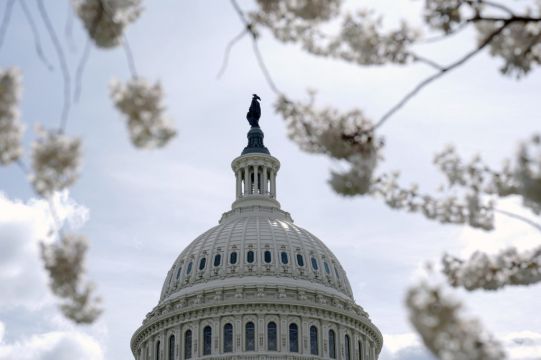Politicians introduced a 1.2 trillion US dollar spending package that sets the stage for avoiding a partial government shutdown for several key federal agencies this weekend and allows Congress, nearly six months into the budget year, to complete its work in funding the government through September.
Democrats were largely able to knock back scores of policy mandates and some of the steeper budget cuts that House Republicans were seeking to impose on non-defence programmes, though House Speaker Mike Johnson, a Republican, highlighted some policy wins, including a nearly 24% increase in detention beds for migrants awaiting their immigration proceedings or removal from the country.
This year’s spending bills were divided into two packages.
The first one cleared Congress two weeks ago, just hours before a shutdown deadline for the agencies funded through the bills.
Now Congress is focused on the second, larger package, which includes about 886 billion US dollars for the Defence Department, a more than 3% increase from last year’s levels.

The 1,012-page bill also funds the departments of Homeland Security, Health and Human Services, Labour, and others.
“Congress must now race to pass this package before government funding runs out this Friday,” said Senate Majority Leader Chuck Schumer, a Democrat.
Non-defence spending will be relatively flat compared with the prior year, though some, such as the Environmental Protection Agency, are taking a hit, and many agencies will not see their budgets keep up with inflation.
When combining the two packages, discretionary spending for the budget year will come to about 1.66 trillion US dollars.
That does not include programs such as Social Security and Medicare, and financing the country’s rising debt.
The House is expected to take the measure up first, on Friday.
Then it would move to the Senate where senators would have to agree on taking it up expeditiously to avoid a partial shutdown.
Usually, such agreements include votes on proposed amendments to the bill.
Mr Johnson described the bill as a serious commitment to strengthening national defence by moving the Pentagon toward a focus on its core mission while expanding support for those serving in the military.
The bill provides for a 5.2% pay increase for service members.
In promoting the bill, Republicans cited several ways it would help Israel.
Most notably, they highlighted a prohibition on funding through March 2025 for the UN Relief and Works Agency, which is the main supplier of food, water and shelter to civilians in Gaza.
Republicans are insisting on cutting off funding to the agency after Israel alleged that a dozen employees of the agency were involved in the attack that Hamas conducted in Israel on October 7.
But the prohibition does concern some politicians because many relief agencies say there is no way to replace its ability to deliver the humanitarian assistance that the United States and others are trying to send to Gaza, where one-quarter of the 2.3 million residents are starving.
Democrats emphasised that humanitarian assistance will increase overall, though.
Democrat Senator Patty Murray, the chairwoman of the Senate Appropriations Committee, also highlighted a one billion US dollar increase for Head Start programmes and new child care centres for military families.

Democrats also played up a 120 million US dollar increase in funding for cancer research and a 100 million US dollar increase for Alzheimer’s research.
“We defeated outlandish cuts that would have been a gut punch for American families and our economy,” said Ms Murray.
She also said Democrats successfully fought off numerous policy measures, known as riders, that House Republicans were seeking to add.
“From day one of this process, I said there would be no extreme, far-right riders to restrict women’s reproductive freedoms — and there aren’t, she said.
Among the few policy provisions that House Republicans did secure was a requirement that only allows for the American flag and “other official flags” to fly over US diplomatic facilities.
Under the Biden administration, US embassies have been invited to fly the pride flag or light up with rainbow colours in support of the LGBTQ community.
There is also a provision that prevents the Consumer Product Safety Commission from banning gas stoves.
But the White House has said President Joe Biden would not support a ban, and the commission, an independent agency, says no such ban was in the works.







